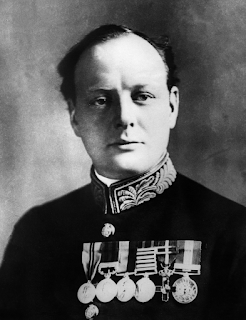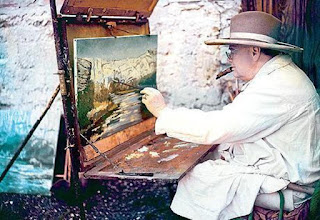Winston on Wings
 |
| Churchill and Clemmie at Hendon Air Pageant, 1914. |
Winston Churchill had been interested in airplanes since the very beginning of their origins. Even in the infancy of aeronautics, Churchill realized how instrumental airplanes could be in warfare. His first proposal on this subject was in February, 1909 – only six years after the Wright brother's first brief but successful flight in Kitty Hawk, and three months after the first "sustained fight" in the UK. "The problem of the use of airplanes was a most important one," he propounded, "and we should place ourselves in communication with Mr. Wright himself, and avail ourselves of his knowledge." The same year, the United States bought the first airplane for its army. Churchill quickly promoted a British air force as well. In 1911 Churchill used his new position as First Lord of the Admiralty to promote what is now known as the Royal Naval Air Service, or RNAS. In a speech on air power in 1913 that he gave at the Lord Mayor's Banquet, Churchill insisted that Britain needed to have a pioneering airplane industry to be successful in war. "I come have come here tonight to tell you that it is not only in naval airplanes that we must have superiority," he announced.
"I would venture to submit to this great company assembled that the enduring safety of this country will not be maintained by force of arms unless over the whole sphere of aerial development we are able to make ourselves the first nation. Many difficulties have to be overcome.... The keenest eye, the surest hand, the most undaunted heart, must be offered and risked and sacrificed in order that we may attain - as we shall undoubtedly attain that command and perfection in aerial warfare which will be an indispensable element, not only in naval strength, but in national security."This idea that areoplanes were necessary to have a strong air force to be a strong country was a groundbreaking one in the early 20th century. Without Churchill pressing it, the outcome of the First World War may have been very different. By 1914, the Royal Naval Air Service had fifty planes, thanks to Churchill. In 1919, Churchill was made the first Secretary of State for Air, giving him command of the Britain's Air Ministry.
 |
| Churchill with his flying instructors, 1913. |
Clementine Churchill, however, was not as keen on Winston's latest hobby. Edwardian airplanes were primitive, flimsy, and dangerous, and the pilots had only a fraction of the control over them that modern pilots do now. To add to the immense danger, Churchill decided to try new and sometimes previously untested models, and often flew in rough weather. He tried to reassure her, writing,
“I have been naughty today about flying. Down here with twenty machines in the air at once and thousands of flights made without mishap, it is not possible to look upon it as a very great risk. Do not be vexed with me.”Clemmie did not change her mind. She asked Churchill's friend, politician F. E. Smith to discourage his risky hobby. Nevertheless, Churchill kept flying, not even dissuaded when a plane that he was planning to take a demonstration flight one crashed just hours before he was scheduled to fly one it. Finally, as Churchillian Christopher Sterling notes, he gave up flying after he was in a minor accident that slightly injured him and more seriously injured his instructor. He realized that the crash could have easily killed them both, and because of this (and also because of Clemmie's pleas) he gave up flying for good.
Sources:
"Churchill's Arial Adventures" by Perry Colvin. https://www.historynet.com/churchills-aerial-adventures.htm
"Churchill and Air Travel" by Christopher Sterling. https://winstonchurchill.org/publications/finest-hour/finest-hour-118/churchill-and-air-travel/
"The Royal Naval Air Service" by Wikipedia. https://en.wikipedia.org/wiki/Royal_Naval_Air_Service
Churchill: Walking with Destiny by Andrew Roberts.
"Secretary of State for Air" by Wikipedia. https://en.wikipedia.org/wiki/Secretary_of_State_for_Air
"A Brief History of the Royal Air Force" by HistoryExtra. https://www.historyextra.com/period/second-world-war/history-royal-air-force-raf-history-facts-ww2-world-war-two-when-begin-founded/
"The United States Buys its First Areoplane, 1909" by Dr. Greg Bradsher. https://text-message.blogs.archives.gov/2019/03/19/the-united-states-army-buys-its-first-aeroplane-1909/
"Winston Churchill: Up in the Air" by Rachel Boon. https://blog.sciencemuseum.org.uk/winston-churchill-science-and-flying/
"Travels with Churchill" by Graham Chandler. https://www.airspacemag.com/history-of-flight/travels-with-churchill-136166507/
Young Titian: The Making of Winston Churchill by Michael Sheldon.
Never Give in: The Best of Winston Churchill's Speeches by Winston S. Churchill (Sir Winston's grandson)
"Churchill and Air Travel" by Christopher Sterling. https://winstonchurchill.org/publications/finest-hour/finest-hour-118/churchill-and-air-travel/
"The Royal Naval Air Service" by Wikipedia. https://en.wikipedia.org/wiki/Royal_Naval_Air_Service
Churchill: Walking with Destiny by Andrew Roberts.
"Secretary of State for Air" by Wikipedia. https://en.wikipedia.org/wiki/Secretary_of_State_for_Air
"A Brief History of the Royal Air Force" by HistoryExtra. https://www.historyextra.com/period/second-world-war/history-royal-air-force-raf-history-facts-ww2-world-war-two-when-begin-founded/
"The United States Buys its First Areoplane, 1909" by Dr. Greg Bradsher. https://text-message.blogs.archives.gov/2019/03/19/the-united-states-army-buys-its-first-aeroplane-1909/
"Winston Churchill: Up in the Air" by Rachel Boon. https://blog.sciencemuseum.org.uk/winston-churchill-science-and-flying/
"Travels with Churchill" by Graham Chandler. https://www.airspacemag.com/history-of-flight/travels-with-churchill-136166507/
Young Titian: The Making of Winston Churchill by Michael Sheldon.
Never Give in: The Best of Winston Churchill's Speeches by Winston S. Churchill (Sir Winston's grandson)



i really enjoyed this reading. your grammar is gorgeous and i would love to read more! very well done Meredith!! keep up the great work
ReplyDeleteAwww, thanks so much Jenna!
ReplyDelete